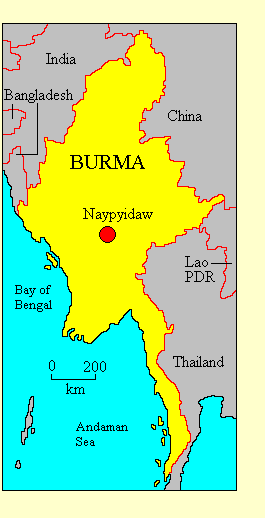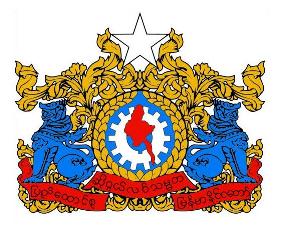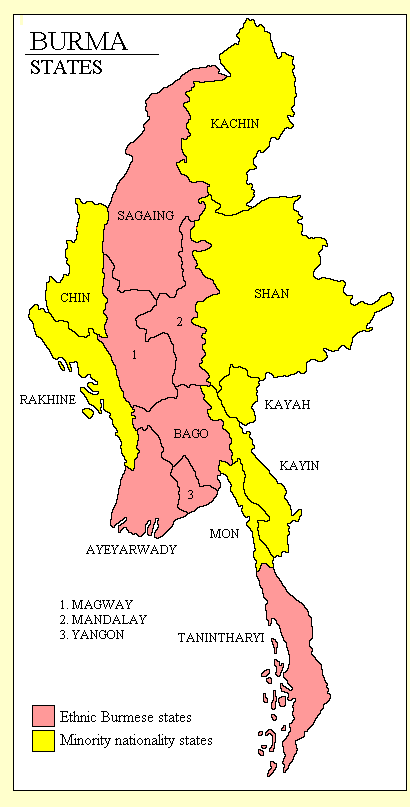

REPUBLIC OF THE
UNION OF BURMA
• Official name: Pyidaungzu Myanmar Naingngandaw (Republic of the Union of Burma). In 1989 the
Burmese regime announced that it had changed the name of the country to Myanmar. This has always been the name of the
country in the Burmese language. This archive takes the view that the English name of the country is Burma,
and should remain so until a democratic Burmese government requests otherwise.
• Location: South East Asia
• International organisations: Association of South East Asian Nations, Non-Aligned Movement, United Nations,
World Trade Organisation
• Borders: Bangladesh, China, India, Lao PDR, Thailand
• Coastline: Indian Ocean
• Land area: 678,500 Km2
• Population: 50,000,000 (estimate)
• Annual GDP (PPP) per capita: US$1,000 (2009 CIA estimate). World ranking: 175. On this ranking Burma
is the poorest country in Asia.
• Ethnicity: Burman 68%, Shan 9%, Karen 7%, Rakhine 4%,
Mon 2%, other 5%. There has been no census in
Burma for many years and these figures are debatable. There are substantial Indian
and Chinese minorities.
• Languages: Burmese is the official language, but is spoken only
in the central, ethnically Burmese areas. All the ethnic groups
mentioned above speak their own languages. Chinese and Indian languages
are also spoken.
• Religion: The great majority of the population are Buddhists. There
are small Christian, Hindu and Moslem minorities.
• Form of government: In theory, a presidential republic, in practice, despite recent
cosmetic changes, a military dictatorship. The Burmese areas of the country are divided into seven states. The ethnic minority areas comprise
seven states which are in theory autonomous.
• Capital: Naypyidaw
• Constitution: The new
Constitution of the Union of Burma came into effect in September 2008. The constitution establishes a formally
democratic system, but entrenches the role of the armed forces in government.
• Head of state: The President, elected by an electoral college comprising members of both houses of the legislature
and nominees of the armed forces, for a five-year term.
• Head of government: The President, who appoints the Cabinet.

• Legislature: Burma has a bicameral legislature, the Union Assembly (Pyidaungsu Hluttaw). The lower house is
the People's Assembly (Pyithu Hluttaw), which has 440 members: 330 elected for five-year terms from single-member
constituencies, and 110 nominated by the armed forces. The upper house is the National Assembly (Amyotha Hluttaw),
which has 224 members: 168 chosen by the Union states, with each of the 14 states having 12 representatives, and 56 nominated by the
armed forces.
• Electoral authority: The Union Election Commission runs elections, under the close supervision of the government.
• Freedom House 2011 rating: Political Rights 7, Civil Liberties 7
• Transparency International Corruption Index: 14% (176 of 178 countries rated)
• Reporters Without Borders Press Freedom 2010 Index: 5.5% (174 of 178 countries rated)
• Heritage Foundation Economic Freedom 2010 Index: 37.8% (174 of 178 countries rated)
Political history
The Burmese Kingdom was annexed to British India in 1885 and its ancient monarchy
abolished. Some degree of self-government was introduced in 1922. In 1937 Burma was
separated from British India and eventual independence promised. After Japanese
occupation from 1942 to 1945, Burmese nationalists led by Thakin Aung San demanded
independence, which was granted in 1948.

Aung San's assassination got independent Burma off to a bad start. The new
federal constitution gave the states autnomomy, but the Shans, Karens and other
minorities never accepted government from Rangoon and Communist-backed insurgencies
have continued on and off in the hill areas. Aung San was succeeded by U Nu, who held democratic elections in 1952
and 1956 and seemed to have stabilised the country.
U Nu resigned in 1960 and was
succeeded by General Ne Win, who in 1962 staged a coup and established a military regime.
Ne Win's regime launched "the Burmese Road to Socialism," which led to the
country's complete isolation and to the steady decline of its once prosperous
economy. Communist and ethnic insurgencies continued. In 1974 Ne Win purported to
transfer power from the military to a People's Assembly, but Burma remained a
one-party state controlled by Ne Win from behind the scenes.
Burma's steady drift into bankruptcy and inertia led the military to depose Ne Win in
September 1988. Free elections were promised, and Aung San's daughter, Aung San Suu Kyi,
returned from exile to organise the
National League for Democracy. In the May
1990 elections the NLD won a huge majority in the People's Assembly. But the military
regime refused to hand over power, prevented the Assembly from meeting, and placed
Aung San Suu Kyi under house arrest, where she remained until 2002. After a period of
freedom she was re-arrested in June 2003. She was again released in November 2010.
In 1992 the regime constituted itself as the State Peace and Development Council,headed by General Than Shwe.
The regime was corrupt, oppressive and incompetent, though the more bizarre excesses of Ne Win's socialist
utopia were abandoned. In 1993 the regime appointed a National Convention to draft a new constitution, which
took 14 years. The new constitution requires that the presidency be held by a military officer and that
25% of the seats in the legislature be reserved for the military.
In May 2008 a constitutional
referendum, widely derided as fraudulent, was held to approve the new constitution, and legislative elections took place in 2010.
As predicted by the NLD and international observers, the elections were a sham, with Aung San Suu Kyi barred from
participation. The Union Solidarity and Development Party, created by the military regime, won a large majority of seats.
Following the elections the military regime was formally dissolved and a presidential government inaugurated, with
Lt-Gen Thein Sein chosen as President by the legislature. Since
the elections there has been some liberalisation, with political prisoners released and an easing of media restrictions.
Freedom House's 2011 report on Burma
says: "Burma is not an electoral democracy. The military junta has long ruled by decree and controlled
all executive, legislative, and judicial powers; suppressed nearly all basic rights; and committed
human rights abuses with impunity. The junta carefully rigged the electoral framework surrounding the
2010 national elections, which were neither free nor fair. The process of drafting the 2008
constitution, which the elections put into effect, had proceeded intermittently for 15 years, was
closely controlled by the military, and excluded key stakeholders. Although the charter establishes a
parliament and a civilian president, it also entrenches military dominance, and allows the military to
dissolve the civilian government if it determines that the "disintegration of the Union or national
solidarity" is at stake...In a system that lacks transparency and accountability, corruption and economic mismanagement
are rampant at both the national and local levels... The junta drastically restricts press freedom and owns or controls
all newspapers and broadcast media... Academic freedom is severely limited... The junta violates workers’ rights and
represses union activity... The judiciary is not independent. Judges are appointed or approved by the junta and adjudicate
cases according to its decrees... Some of the worst human rights abuses take place in border regions populated by ethnic
minorities."
Updated November 2011
|

